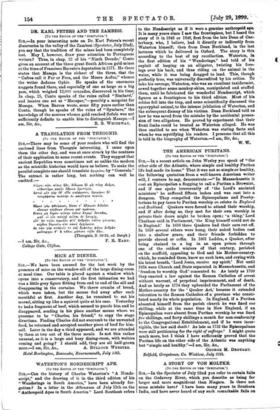THE AMERICAN PURITANS.
[TO THE EDITOR OF THE "SPECTATOR."]
SIR,—In a recent article on John Wesley you speak of "the other aide of the Atlantic, where simple and healthy Paritan life had made its home." That it was not so simple or healthy, the following quotation from a well-known American writer will, I venture to say, demonstrate :—" In Massachusetts it cost an Episcopalian a flogging to call a Puritan a Brownist, and if one spake irreverently of 'the Lord's anointed ministers' he suffered fifteen lashes and was cast into a dungeon. They compelled the Episcopalians and Presby- terians to pay taxes to Puritan worship on estates in England and Scotland. Quakers were forced to attend their worship, and if after doing so, they met for their own worship in private their doors might be broken open; 'a thing,' Lord Chatham said in Parliament, the King himself could not do in England.' In 1658 three Quakers had their ears cut off. In 1659 several others were hung, their naked bodies cast into a shallow grave, and their friends forbidden to provide shroud or coffin. In 1661 Laddra, a Quaker, after being chained to a log in an open prison through one of the coldest winters of that century, perished on the scaffold, appealing to God and his Mother-country, which, he reminded them, knew no such laws, and crying with his latest breath, 'Lord Jesus, receive my spirit.' Not until 1834 were Church and State separated in Massachusetts, and freedom to worship God' consented to. As lately as 1700 they enacted a law against the Roman Catholics of arrest without warrant, of perpetual imprisonment, and of death. And as lately as 1774 they upbraided the Parliament of the Mother-country for the Quaker Act,' because it extended toleration to the Roman Catholics of a province who consti- tuted nearly its whole population. In England, if a Puritan absented himself from the parish church he was fined one shilling, while at the same time in New England, if an Episcopalian were absent from Puritan worship he was fined five shillings, and forty shillings a month for non-conformity to the Congregational Establishment, and if he were incor- rigible, the law said death ! As late as 1731 the Episcopalians were still petitioning for the right of suffrage." I might quote much more, but I think I have sufficiently proved that the Puritan life on the other side of the Atlantic was anything but "simple and healthy."—I am, Sir, Ste.,
GEORGE M. DROUGHT.
Bel. eld, Greystones, Co. Wicklow, July 25th.


































 Previous page
Previous page